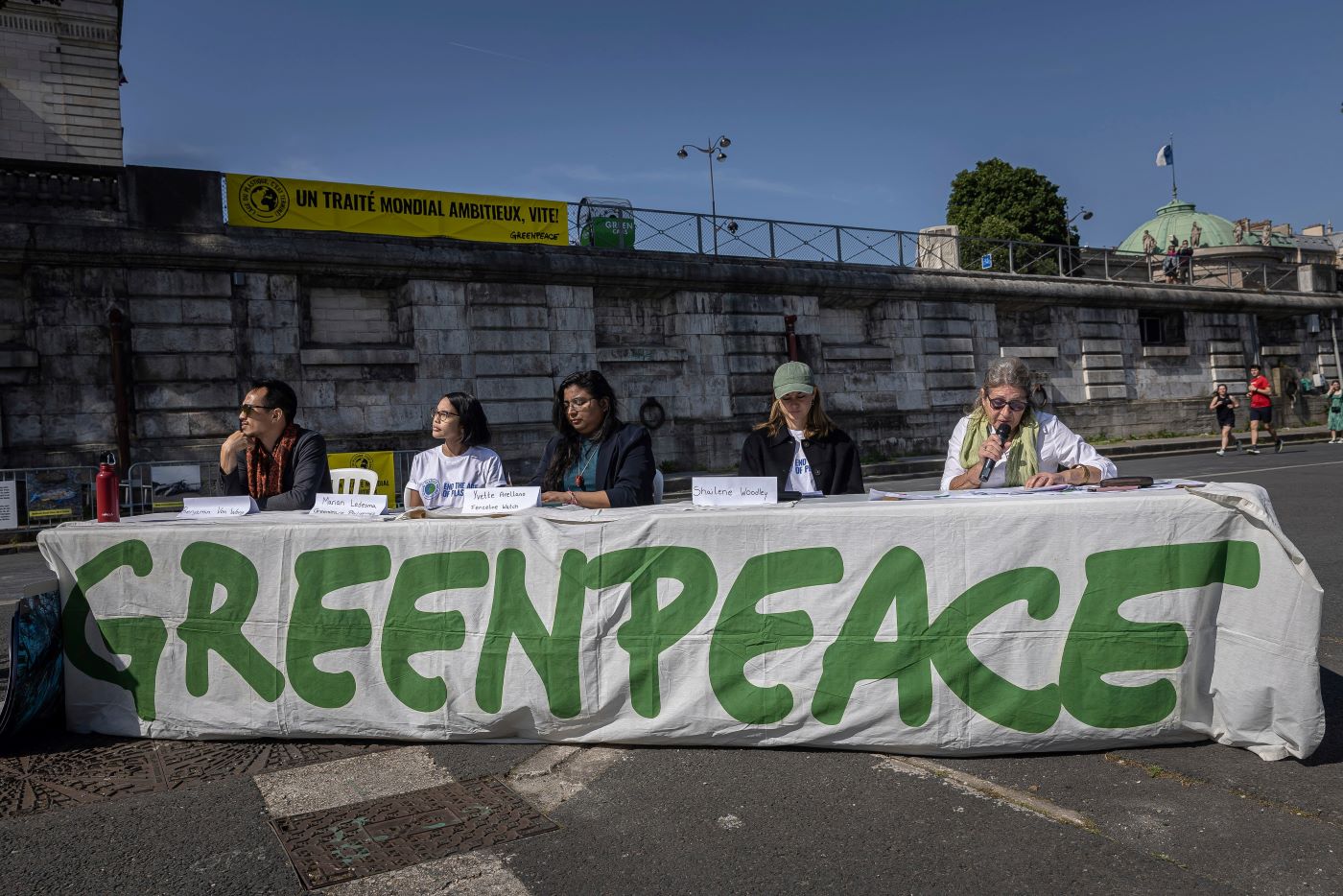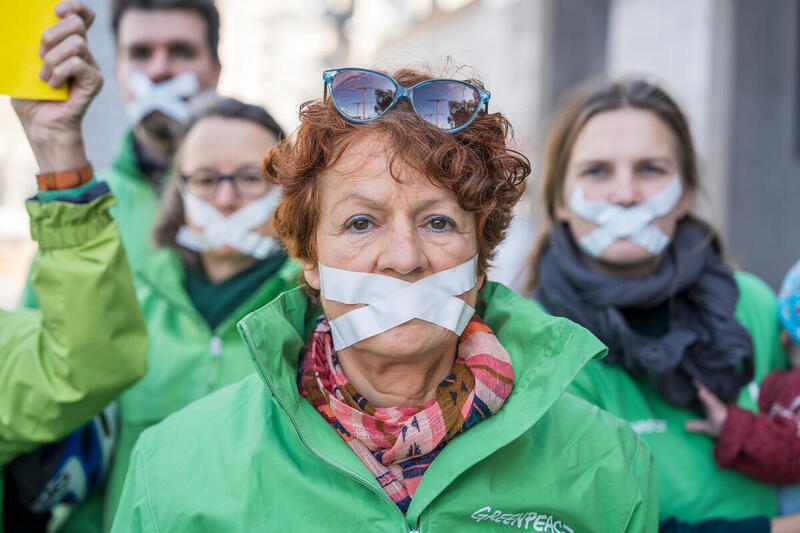Organizations and activists within the climate justice movement are uniting to push back against the broader chilling effect of a significant legal defeat that threatens to bankrupt one of its largest players.
Earlier this week, a jury in North Dakota found Greenpeace International and its U.S. affiliates guilty of defamation, trespass, nuisance, and conspiracy, ordering them to pay over $660 million in damages to oil pipeline company Energy Transfer.
The lawsuit stemmed from protests against the Dakota Access pipeline in 2016 and 2017. These demonstrations, centered around the Standing Rock Sioux Reservation, brought together Indigenous activists advocating for water rights and climate campaigners opposing the company’s plan to transport oil from North Dakota to Illinois. While the protests did not prevent the pipeline’s completion, they caused significant disruption.
Greenpeace’s Damages Ruling a ‘Wake-Up Call’ to the Climate Movement
Energy Transfer had previously sought damages in a federal lawsuit against Greenpeace and others, but the case was dismissed in 2019.
This time, however, the company’s legal team successfully argued that Greenpeace had “incited” the disruption. Greenpeace countered that its U.S. affiliates played only a minor role and that its international organization merely signed a letter opposing the project.
Greenpeace Plans to Fight Back
Energy Transfer hailed the verdict as a “resounding” win, calling Greenpeace’s actions “wrong, unlawful, and unacceptable by societal standards.” The company also declared that the ruling marked a “day of reckoning and accountability” for Greenpeace.
In response, Greenpeace’s U.S. affiliates announced plans to appeal, while Greenpeace International stated it is “weighing all legal options.”
Greenpeace, which has been a major force in environmental activism since the 1970s, acknowledged that the damages ruling presents a risk of bankruptcy. However, it considers this threat “very remote” for its international branch, as its assets are located in the Netherlands, where Dutch courts are “very unlikely” to enforce the U.S. verdict. Greenpeace’s 25 other global offices are expected to continue operating as usual.
The case has been classified as a strategic lawsuit against public participation (SLAPP), a type of litigation that emerged in the U.S. in the 1970s and ’80s. These lawsuits vary across jurisdictions but are increasingly seen as a “lawfare” tactic used by powerful companies and individuals—many of which involve environmental issues.
Concerns Over Trial Fairness
Sushma Raman, interim executive director of Greenpeace’s U.S.-based organizations Greenpeace Inc. and Greenpeace Fund, described the ruling as part of a broader corporate strategy to weaponize the legal system to silence dissent. She argued that such lawsuits are designed to “destroy our rights to peaceful protest and free speech.”
Concerns have also been raised about the fairness of the trial. An independent legal monitoring committee concluded that the proceedings were “deeply flawed,” citing multiple due process violations that prevented Greenpeace from mounting a full defense.
The committee alleged that the jury was “patently biased,” as many jurors worked in the fossil fuel industry, and the judge lacked an understanding of the complex constitutional issues involved in the case.
Charlie Holt, European lead at Global Climate Legal Defense and a former legal advisor for Greenpeace International, described the ruling as shocking but not surprising. “There’s still an understandable desire to trust in the judicial system, but I think we could see how urgent a threat [the lawsuit] was,” Holt told.

Greenpeace (Photo: AP)
Brice Böhmer, climate and environment lead at Transparency International, agreed, warning that the case reflects a broader pattern of fossil fuel interests working to undermine climate action.
SLAPP Lawsuits on the Rise
Holt also cautioned that the verdict could encourage similar lawsuits. “The big fear is that this will embolden other fossil fuel companies to try their luck with these large-scale SLAPPs as a means of shutting down criticism,” he said.
Although SLAPPs are increasing in Europe as well, legal systems there tend to be less sympathetic to such claims.
In December, Greenpeace UK and Greenpeace International settled out of court in a legal dispute over the environmental group’s activism on an offshore oil production vessel. The case was among the most significant legal threats Greenpeace has faced.
Meanwhile, in March of last year, a French court ordered oil and gas company TotalEnergies to pay €15,000 ($16,200) in legal fees to Greenpeace France after failing to sue the NGO over a report that accused the energy giant of massively underreporting its 2019 greenhouse gas emissions.
Greenpeace Countersues Energy Transfer in the Netherlands
Encouraged by legal victories like these, Greenpeace International is launching a counter-lawsuit against Energy Transfer in the Netherlands, seeking to recover all costs and damages. If successful, this case would mark the first application of the new EU anti-SLAPP Directive.
Kristin Casper, Greenpeace International’s general counsel, vowed that the organization would not back down. “We are just getting started,” she said. “We will not be silenced.”
A Warning for the Climate Movement
As part of a Global Week of Action, Greenpeace East Asia’s Taipei office joined Greenpeace activists worldwide in sending a unified message to Energy Transfer: “We will not be silenced.”
Anne Jellema, chief executive of climate advocacy group 350.org, called the ruling a “wake-up call” for the entire climate movement, especially as it coincides with potential rollbacks in U.S. environmental protections and an expansion of fossil fuel production.
“The ruling sends a dangerous message to environmental organizations worldwide—that corporate polluters can weaponize the courts to silence opposition,” Jellema said. She warned that the case is particularly troubling for smaller frontline groups operating in regions with weaker legal protections.
“If one of the world’s most prominent environmental organizations can face financial ruin for speaking out, smaller movements with fewer resources are even more vulnerable,” she said.
Since the initial lawsuit over the Dakota Access Pipeline in 2017, Greenpeace has been rallying civil society groups behind U.S. and European anti-SLAPP coalitions. A global show of support came in the form of an open letter to Energy Transfer, signed by 450 organizations worldwide.

